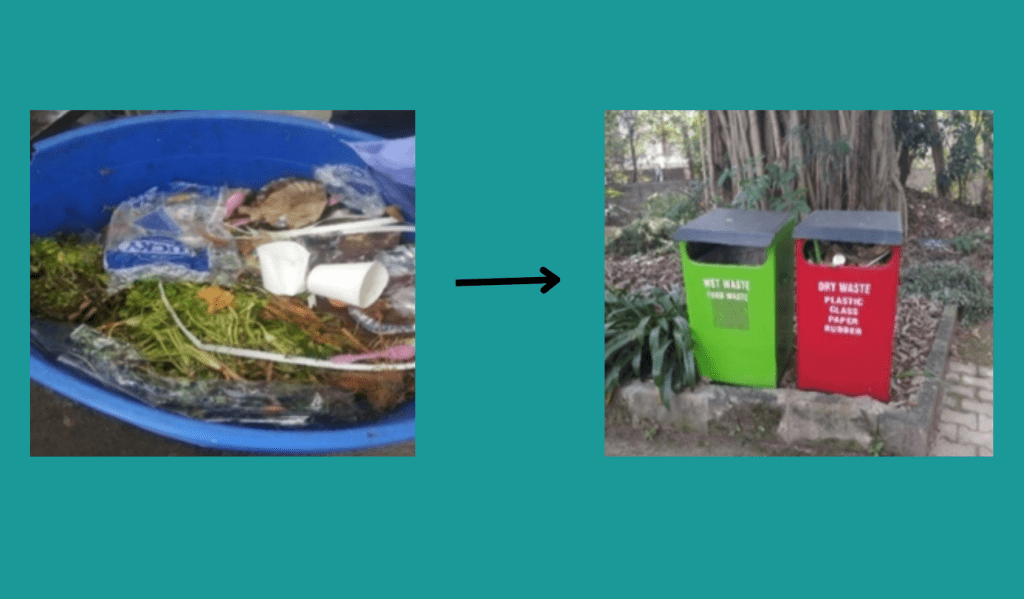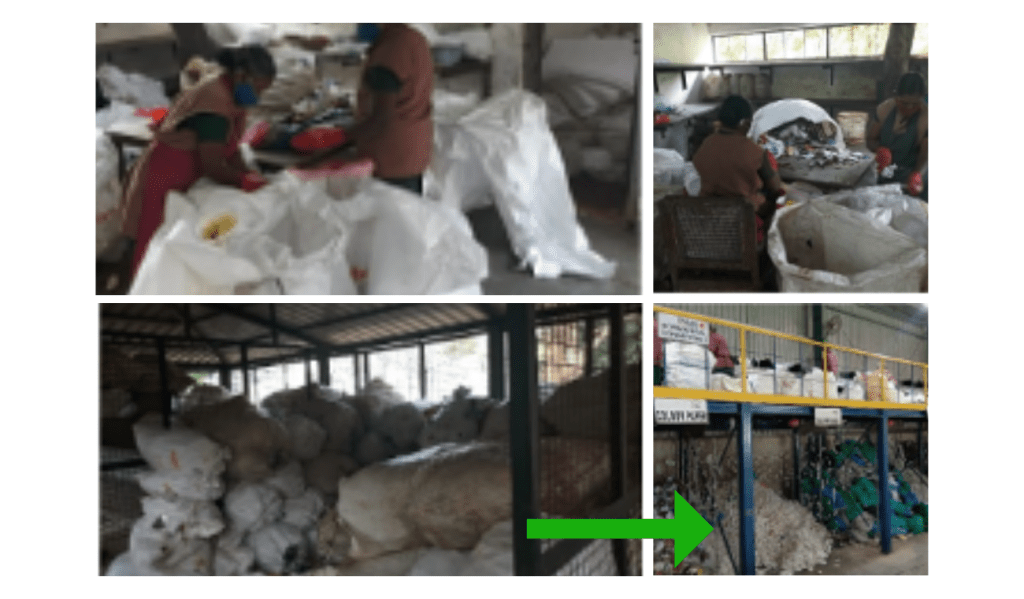Climate Impacts from our waste are becoming Harder to Ignore
Read the Magazine in PDF
We are now at the helm of a decisive decade as human-induced climate change has drastically impacted the environment and the core quality of nature. Solid waste contributes directly to GHG (Greenhouse Gas) emissions through the generation of methane from the anaerobic decay of waste in landfills and the emission of nitric oxide from solid waste combustion facilities. Similarly, plastic waste produces GHG emissions during every stage of its cycle causing health concerns.
In line with the above, World Health Organization(WHO) has put “Guidance on Solid Waste and Health” drawing parallels to sustainable solid waste management and wellbeing. They reiterate that improper disposal can lead to adverse health outcomes resulting in cholera and vector-borne diseases such as malaria and dengue. WHO Compendium for solid waste management follows the three-tiered approach (the 3Rs): Reduce, Reuse, and Recycle. Furthermore, the United Nations “Sustainable Development Goals” (SDGs) emphasize the need for sustainable Solid Waste Management (SWM), which fosters a circular urban economy that promotes reduction in consumption of finite recourses, material reuse and recycling for waste elimination, pollution reduction, cost savings and
green growth.
Not limiting to the above, The Intergovernmental Panel on Climate Change (IPCC), which is the United Nations body for assessing the science related to climate change, has prepared a comprehensive assessment report (AR6 – 2023) on how adverse impacts from human-caused change will intensify in the future and as a result, action is required along numerous dimensions to ensure clean energy, water, air and well being.
Additionally, having identified that unmanaged waste is a hidden cause of climate change at the COP27 event, COP28 (28th Conference of Parties) will be the final critical climate moment of 2023, as action is needed now more than ever.
Health Care Industry Waste Generation
As populations, economies and living standards grow, so does the cumulative level of waste generation, which has consequential health hazards. Healthcare sectors are essential sites for waste generation. Their waste generation can be categorized into bio-medical waste (such as needles, contaminated dressing, pharmaceutical, chemical & radioactive items), which are hazardous in nature and can be pathogenic and environmentally adverse, e-waste (such as tube lights, measuring instruments, medical equipment, batteries etc.) and the municipal solid waste (comprising of the wet and dry waste).
As per the “Biomedical Waste Management Rules 2016”, the waste management process should begin at the site of generation, where medical waste has to be appropriately collected and segregated from the non-hazardous waste in specific colour-coded receptacles. Transportation of these hazardous healthcare wastes should be well-mapped in the hospitals and conveyed by special carts. While biomedical waste is handled through authorized persons, little or no attention is given to the proper disposal of Municipal Waste and E-Waste.
Health hazards of improper Solid & E-Waste Management
Given the above, solid waste management continues to dominate as a significant societal and governance challenge owing to the population and influx of people seeking medical care. The process is bound by the “Solid Waste Management Rules 2016” and “E-Waste (Management) Rules 2022” published by the Ministry of Environment, Forest and Climate Change.
Solid waste disposal, which was part of our everyday routine activity with zilch significance in the past, has now gained paramount importance. The unsustainable approach of dumping or burning waste in an open space or throwing garbage into the water, uncontrolled dumping and landfills was an acceptable garbage disposable strategy in the recent past. The same practice continues in several informal sectors and remote areas to date. This approach poses several sustainability problems, including resource depletion, environmental pollution, land degradation, methane emission and public health problems such as the spread of communicable diseases. In addition, health issues can arise directly through the handling of solid waste in informal sectors and indirectly through water, soil and food consumption.
Undoubtedly, we are in a chronic waste crisis, and our choices will reverberate for hundreds, even thousands of years. Therefore, a more sustainable waste management approach prioritizes reduced production, waste classification/characterization, reuse, recycling and energy recovery over landfilling and open incineration methods.
The Government of India’s flagship scheme, Swachh Bharat Mission, has brought Municipal Solid Waste Management to the forefront of governance. Bulk generators like tech parks, corporate and hospitals have identified opportunities. They are responsible for their waste generation and must process it responsibly towards becoming zero-waste campuses.
Hospital canteens and kitchens generate a lot of food, dry waste, and cooking oil. Similarly, non-medical waste, including packaging waste at the wards, office spaces and stores, needs to be collected separately and sent for formal processing through authorized service providers.
Case Study for Sustainable Decentralized Waste Management by Saahas Zero Waste
Indian Institute of Management, Bangalore (IIMB), one of Asia’s most prestigious management schools, spread across 100 acres, tapped on opportunities to manage solid waste responsibly and sustainably. They engaged Saahas Zero Waste to apply their design and execution process for a holistic, end-to-end waste management system that works on a regenerative economy and global commitment to Sustainable Development Goals (SDGs)
- Before commencing operations at IIMB, SZW (Sahaas Zero Waste) studied the waste generation patterns and conducted a waste audit.
- SZW then introduced a “Source Segregation” system wherein the waste is segregated at the source into 3 streams: bio-degradable (wet) waste, non-biodegradable (dry waste) & domestic hazardous waste, thereby increasing resource recovery.
- Introduced a twin bin system across the campus for dry and wet waste with training and awareness sessions for all the stakeholders

Source Segregation
Waste was collected on a daily basis for further onward channelization to waste processing facilities.
- The waste management unit at IIMB can now sort and channel 400 kg of dry waste daily and process 150 – 200 kg of wet waste through tank composting daily.
- The received wet waste is further sorted at the unit, and 150 to 200 kg of segregated wet waste will be transferred to a biogas facility located within the campus.
- The dry waste is sorted and sent to the Material Recovery Facility of Saahas Zero Waste, located in Jigni.
- Mixed waste, which includes solid dry waste, is non-recoverable and is sent to a processing plant based in Doddaballapur, North Bangalore.
- Domestic hazardous waste and sanitary waste are sorted out and sent to their respective destinations once a week.
- Internal audits are conducted regularly to monitor the quality and progress of work, along with detailed documentation.
Due to efficient sorting, the number of rejects was reduced significantly during the tenure. This was achieved by the field staff through the following methods.
- Re-sorting the rejects
- Containers are cleaned with clothes
- Creating awareness of rejecting waste effect
- Special training on rejects to SZW field staff
- Daily tracking information of outcasts and data maintenance.
The objective of ensuring maximum resource recovery from waste and thereby sending minimum waste to landfill was successfully achieved end to end during the tenure of the project, a vision of SZW to create a Zero Waste World through the circular economy in line with SDGs (Sustainable Development Goals).

Zero Waste Certification

Hospitals can go a further mile by getting certified for Zero Waste by using frameworks that showcase resource recovery and reduction as the main theme.




